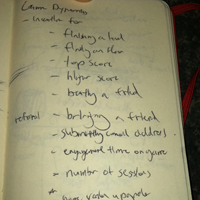The first thing you notice about Kiip CEO Brian Wong is how decidedly un-CEO he actually looks.
Case in point: I made two swervy surveillance laps around a not-at-all-crowded, lower-level concourse in 30 Rock before I spotted the 20 year old Digg alum alone at a table, scrunched over his iPhone. In nerdy black glasses and a halfway zipped navy hoodie (flecked with kaleidoscope colors on closer inspection), the young man who graduated from college as a fresh faced 19 year old could’ve very well been, you know, anyone.
Kiip is a start up venture that came out of stealth mode earlier this month. Wong and his team (which include former high-ups at Digg and EA) have raised just over $4 million dollars in initial funding.
So what does Kiip do? Essentially, it’s adding a whole new dimension to the mobile gaming ad model.
When mobile gaming started getting big, “Advertisers needed a solution really quickly,” Wong tells me over coffee. “And the only way we know how is to take a piece of your screen with a banner ad. And nothing about banner ads in mobile feels natural.”
What Kiip does is so brilliant it’s almost shocking. The rewards network provides game developers with a targeted advertising system that aligns in-game achievements with brands. In other words: score a thousand points, and a voucher for a bag of Pop Chips comes up onscreen.
“One of things that I realized is that with traditional advertising, like when you see something like Mad Men or when you see Ogilvy — the geniuses of the ad space — it was all experience, it was all about emotion. It was never about, ‘Hey how can I reach you in real time and blast you with messages.’”
Techland: As an advertiser, why is leveraging emotion so important?
Brian Wong: When you see an ad on TV that you don’t like, like a sandwich, you can ignore it. When you see an ad on an iPhone or an Android device that you don’t like – that you have to see – it’s going to annoy you.
What we’re trying to do is bring emotion back to advertising. We’re really trying to bring sexy back. We’re trying to tie your feelings for a brand with a parallel set of [positive] emotions.
How did Kiip come to you? Was there some big “A-ha!” moment?

Kiip's humble beginnings
It didn’t happen instantly. My epiphany was almost a month long, and… actually, I could show you. (He pulls out his Moleskine and flips to a page of scribbles)
I realized there’s something about how you’re addicted, and how you play, and how you’re incentivized to continue playing a game that can be tied directly to a particular behavior. I just didn’t know exactly how. At first, I was trying to make it really complicated, and then it hit me. There’s one thing in every game that’s universal: Every game has an achievement.
And that’s when I was like, “Holy f*ck, this achievement element is completely overlooked. I started thinking about virtual awards, and then leaderboards, and then badges, and I realized that companies like Scoreloop and Open Feint have started to merge rewards and gaming. And then I realized those are all virtual things. Why haven’t they tried doing it with physical things?

